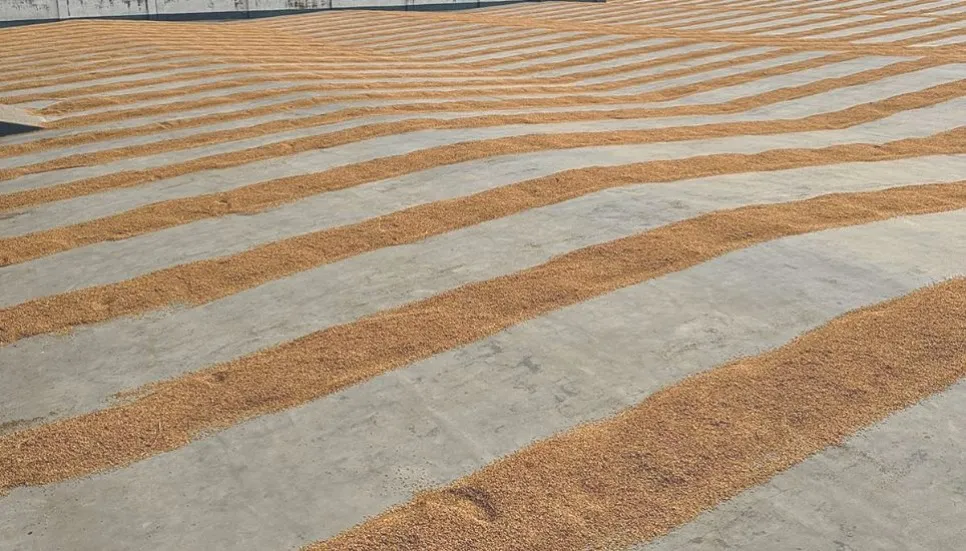
A group of forward-thinking mill owners in Thakurgaon and Dinajpur are defying the trend of mass-producing polished rice in auto-husking mills.
These visionary individuals have opted for a different path, one that not only preserves the nutritional integrity of rice but also champions eco-friendly production methods.
The decision to produce full-grain rice stems from a commitment to establishing a distinct brand image centred around safe and nutritious offerings. Thanks to growing health awareness among people for the benefits of full grain these millers opted for this approach. The shift is not just evident in local markets but has extended to the online space, leading to a notable uptick in sales.
The Sustainable Enterprise Project of the Palli Karma Sahayak Foundation (PKSF) is orchestrating the movement through the Eco-Social Development Organization (ESDO). The project, aptly named “Promoting Full Grain Rice,” not only emphasises the nutritional value of rice but also seeks to mitigate environmental pollution associated with husking facilities.
The overarching goal is to bolster income for entrepreneurs by fostering comprehensive environmental development in rice mills across Thakurgaon and Dinajpur. This involves the eco-friendly processing of safe full-grain rice and expanding its market presence.
To achieve this, the SEP project focuses on multiple fronts. Chimneys of the rice mills are being upgraded to reduce air pollution, while the by-products of rice processing are being ingeniously repurposed. Rice bran becomes nutritious cattle and fish feed, and rice husk transforms into high-capacity fuel charcoal. Additionally, the ash generated from rice coal is being utilised to manufacture eco-bricks, contributing to sustainable agricultural practices.
Md Jahangir Alam, the owner of M/s Purity Rice Agency, emphasises the nutritional benefits of retaining the light coating on rice—a feature lost in the production of auto-husking milled rice.
He notes that full-grain rice, with its light coating, not only retains essential nutrients but also boasts a richer flavour compared to polished rice.
The demand for full-grain rice remains robust, with many customers placing personal orders. Alam said, “Apart from selling in the market, we get a lot of orders personally. Many people order by phone and have to send it by courier services.”
ESDO officials indicate that the project spans five upazilas, including Birganj, Bochaganj, and Dinajpur Sadar, as well as Thakurgaon Sadar and Pirganj in Thakurgaon and Dinajpur districts. With a membership of 1,000 people over a three-year period, the project is actively curbing black smoke emissions, fostering technological demonstrations, and encouraging the adoption of modern, high-quality chimneys.
The creation of a full-grain rice sales centre, alongside the use of QR codes for traceability, adds a modern touch to the traditional rice production process.
Buyers can now access detailed information about the production journey by scanning QR codes through websites and social media platforms.
In a bid to ensure the nutritional value of full grain rice, extensive testing of Ganjia, BR-84 Zink, Siddha Katari, BR- 28 and 29 varieties has been conducted by Bangladesh Council of Science and Industrial Research (BCSIR) and SGS Bangladesh and in India. Simultaneously, harmful chemical usage in rice processing has been significantly reduced, contributing to a visible enhancement of the overall environment within the processing plants.
The efforts in Thakurgaon and Dinajpur align with the broader goals of PKSF’s SEP. The project, backed by the Bangladesh government and funded by the World Bank, strives to embed environmentally friendly technologies in small enterprises.
By assisting business clusters across various sectors, SEP aims to enhance marketing capabilities, promote brand building, and foster environmental sustainability. Under the project, 64 sub-projects under 30 different economic sub-sectors are being implemented in 37 districts of the country through 47 subsidiary organisations of the PKSF.